10 Myths About Aldi Meat You Probably Fell For
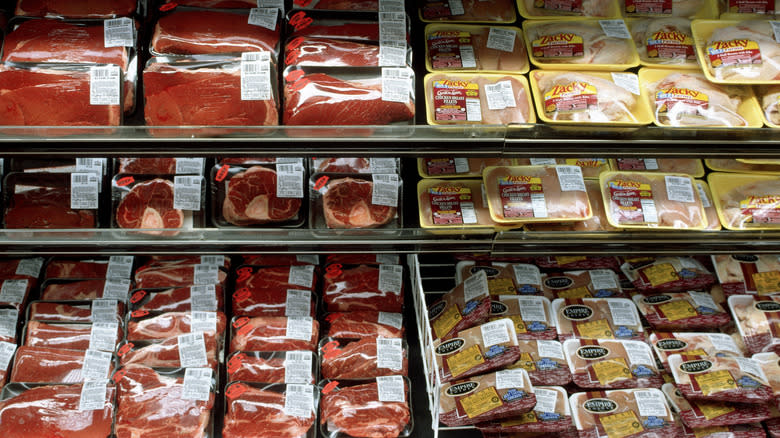
It's the most popular protein source in the world: meat. Chicken, beef, fish, turkey, lamb, and pork litter the aisles of virtually every grocery store and market on the planet, from small mom-and-pop butchers all the way to the world's largest retailers. One of these meat-carrying giants is the famous discount grocer Aldi, which was founded in Germany by the Albrecht family. With 2,362 locations now established in the United States alone, the industry powerhouse is helping to put countless steaks, meatballs, shrimp, and salmon on people's plates ... but oftentimes these products are looked upon with just a slight air of suspicion.
For one reason or another, the Aldi franchise has racked up quite a bit of bizarre speculation regarding its meat. Whether based on fact or completely unwarranted, there's probably a good chance that you have bought into some of these meaty whisperings and that they have affected your shopping experience at the discount retailer in one way or another. Allow us to put your mind at ease by exposing and debunking some of these customer theories. From infected chicken to shady expiration dates to food dyes, here are 10 myths about Aldi meat you probably fell for.
Read more: The Most Delicious Aldi Finds Of All Time
Myth: Aldi Sells Expired Meat
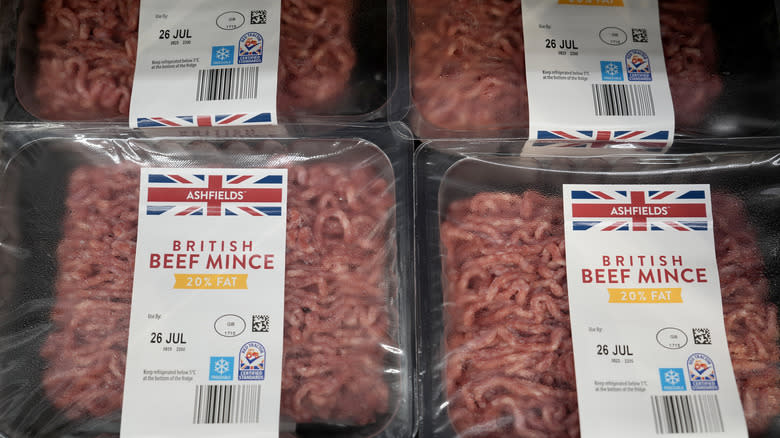
"Tired of wasting my money at Aldi," reads the title of a Reddit thread under which a frustrated user vents about their feelings regarding the discount store's meat products, which they claim seem to go bad in an unusually short time. Since other shoppers have reported having similar experiences, it has led some to speculate that Aldi might be selling meat that is already past its due date.
According to online statements by employees, however, this couldn't be further from the truth. While discounts are reportedly placed on any packages within two days of their expiration dates, meat that has passed this stamped-on guideline is discarded or donated. Customers describe similar experiences, with one consumer describing a situation where they were denied permission to purchase several expired meat packages to take home and freeze. The saleswoman, the customer outlined in her post online, wouldn't sell it, insisting that she would be fired if she did so. Workers additionally divulge via online threads that any questionable-looking meat product will be promptly removed from the aisles, rather than sold to shoppers. While getting the occasional bad pack of ground beef is possible with any store that sells perishables, it's important to note that Aldi has different suppliers depending on location. If you're having repeat issues with bad meat at your store, it is likely a regional problem rather than an Aldi-wide phenomenon.
Myth: Its Bacon Is Grown In A Lab
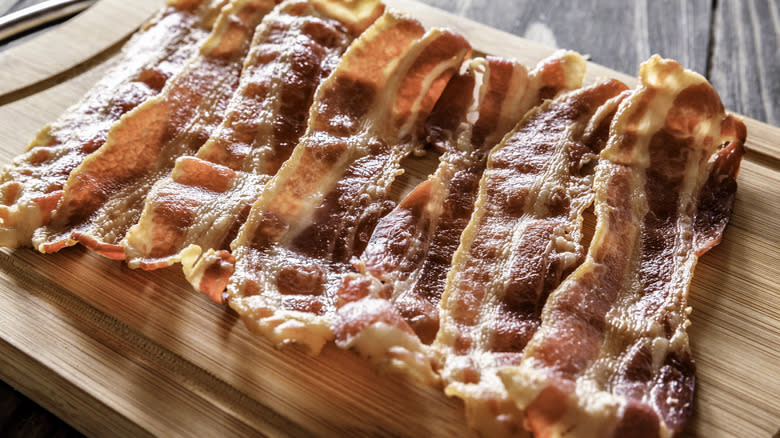
In our modern age, all it takes is one social media post to get a rumor started, shared worldwide, and quickly blown out of proportion. Recently, grocer Aldi found itself at the center of a social media hoax involving its Appleton Farms brand bacon. In March of 2024, the bizarre myth that Aldi was selling lab-grown bacon slices to the masses began circulating online, with users on platforms such as TikTok and Instagram warning shoppers not to purchase the funky faux pork.
However, this rumor was quickly put to rest by the company itself. In a statement to The Associated Press on March 22, Aldi confirmed that its brand, Appleton Farms, was in no way utilizing cultivated cells to grow its pork slices. However, there does exist a biotechnology meat company with a similar-sounding name to the grocery store's bacon brand -- Appleton Meats -- that is indeed experimenting with the use of cellular agriculture to produce beef and chicken ... and it appears that confusion between the two brand names is what caused the grand scale misunderstanding in the first place. Appleton Meats, which is based in Vancouver, British Columbia, Canada, is in no way connected to Aldi's Appleton Farms so you can throw all those false social media claims out with the garbage the next time you're peeling open a bag of Aldi bacon in preparation to sizzle some good old-fashioned pork strips on the stove.
Myth: Aldi Sells Horse Meat

Though some cultures enjoy horse meat as a delicacy, it's considered taboo in most English-speaking countries. That's why for many consumers -- especially those in the United States or the United Kingdom -- this next myth is a bit stomach-curdling. "The mother got us a piece 'British Venison' from Aldi over the weekend," joked a user on Reddit. "So, long story short, it's probably horse [meat]."
Unfortunately, the idea that the grocer intentionally sells horse flesh has become widespread — and although untrue, it has factual origins. In 2013, a single incident with a dishonest supplier left shoppers disgusted and the Aldi corporation furious: Two of its frozen "beef" products were found not to be stuffed with beef at all -- but rather, horse. The discount grocer was one of multiple vendors affected by the horse meat scandal, which stemmed from the French food supplier Comigel. The Aldi corporation expressed shock, frustration, empathy toward its customers, and feelings of betrayal regarding its partner. Although considered safe to eat, the affected foods were immediately recalled and pulled from the shelves, since Aldi insists that its customers should be getting exactly the type of animal flesh stated on the label. The jarring incident has left some shoppers wary to this day -- but though the ordeal was bizarre, it was a one-time occurrence, and horse meat has not been seen in the aisles of Aldi since.
Myth: All Of Aldi's Chicken Is Woody
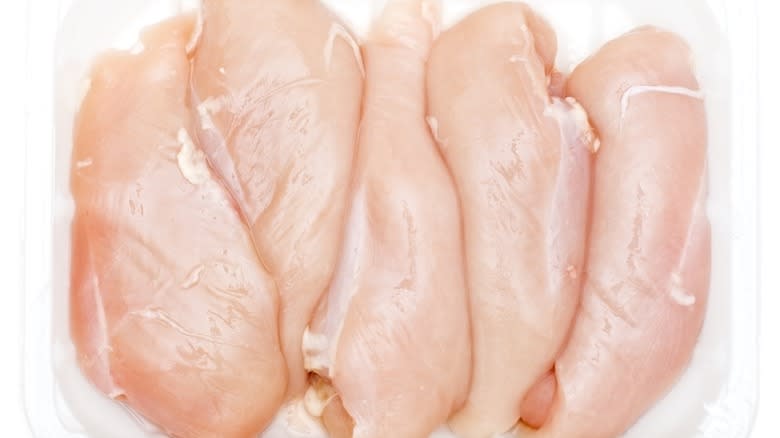
Woody chicken is a term used to describe tough, pale poultry breast cutlets primarily found in farm-raised chickens. It is thought to relate to rapid growth rates in birds raised for slaughter, as the stress on the chicken's body causes collagen and fat to infiltrate the muscles, making them rigid ... not exactly an appealing quality in a meal.
Aldi's chicken breast cutlets, sadly, have harbored a bit of a reputation for being frequently woody. While there is some truth to this -- there have, in fact, been reports on Reddit and other online platforms of Aldi customers cooking up tough, hard-to-chew chickens from the discount grocer -- it appears to be a wider-scale industry problem, rather than an issue specific to Aldi alone. In 2022, Today released an article about the fibrous breasts, declaring them "more prevalent than they've ever been" in grocery stores across the United States. Although there's a chance you may find woody poultry at your local Aldi, of course, the risk appears to be about the same as encountering a similar pack from any other store.
The good news? There are things you can do to reduce your chances of ending up with a tough-to-chew chicken. Buying organic, free-range cutlets, opting for thighs as opposed to breasts, and physically touching the chicken to check for desirable tenderness are all steps you can take to protect yourself from a woody meal -- at Aldi, or anywhere else.
Myth: Aldi Won't Take Back Spoiled Meat
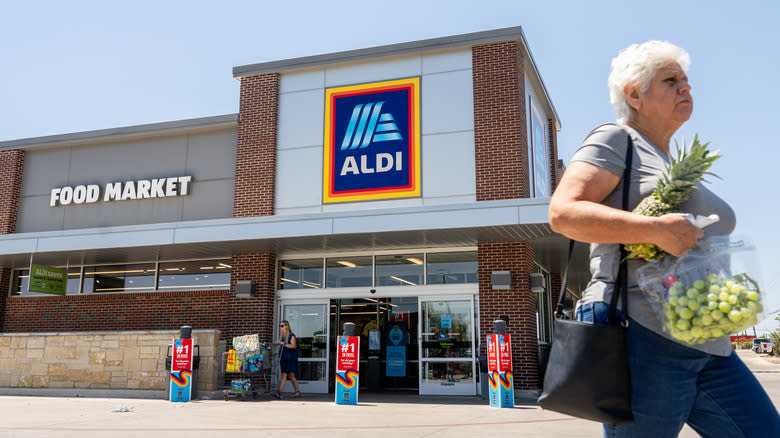
It's the worst feeling in the world: You finally get home after a long grocery trip and rip open the container of ground chuck to start dinner, only to realize immediately that the meat is discolored and smelly. There goes your dinner plan ... not to mention the money you spent on the increasingly pricy beef. But if Aldi is the grocery store you just came from, there's no reason to eat the cost of a spoiled slab of meat, whether chicken, beef, pork, or fish.
Though you may not have previously been aware of it, the celebrated discount grocer has a wonderful return policy, deemed the "Twice as Nice Guarantee." While climbing back into your vehicle to return to the store after finding spoiled meat might sound like a total hassle, Aldi makes it worth the effort. Not only will the company replace the package of spoiled meat, but it will also refund it in full for your trouble -- a double perk that certainly makes the drive worth it in our book. But if your timeline is too tight and you can't make it back to your Aldi location on the same day of purchase, that's okay, too. According to consumers, bagging up your slimy find and bringing it in the following day is perfectly acceptable ... just make sure you tie the bag up tight to avoid any of that undesirable smell infiltrating your home in the meantime.
Myth: Its Steaks Aren't Worth The Purchase
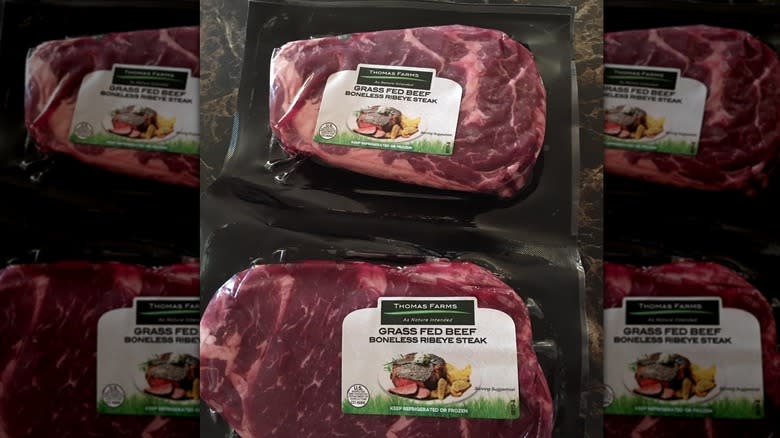
Steak is generally considered a high-end meat product, and many might turn their noses up at the idea of purchasing a top sirloin or a New York strip from a discount grocer. However, in the case of Aldi, its consistently highly-reviewed steak cuts might serve to change some minds.
"I cannot get over what a good value their ribeye steak is," praised a consumer on Reddit, referring to both the advantageous price and great quality of the Aldi's mouth-watering, large-sized Ribeyes. It doesn't take long to see how thoroughly this opinion is echoed on the platform by other consumers, regarding a plethora of other red meat products.
Shoppers sing the praises of the discount grocer's beef tenderloin, filet mignon, black Angus, and others, divulging that some of the least-expensive slabs of beef they've ever witnessed can be found in the refrigerated aisles of Aldi. But it's not only the lower price point that impresses; it is the quality and taste of the meat, as well. "Honestly, Aldi has a solid steak program. I've never been let down," confirmed another happy shopper on Reddit. The consumer praise goes on and on, leading us to conclude that we can safely put the myth "never buy a steak from a discount grocer" to rest — at least in the case of Aldi.
Myth: Its Fresh Atlantic Salmon Is Sustainably Raised
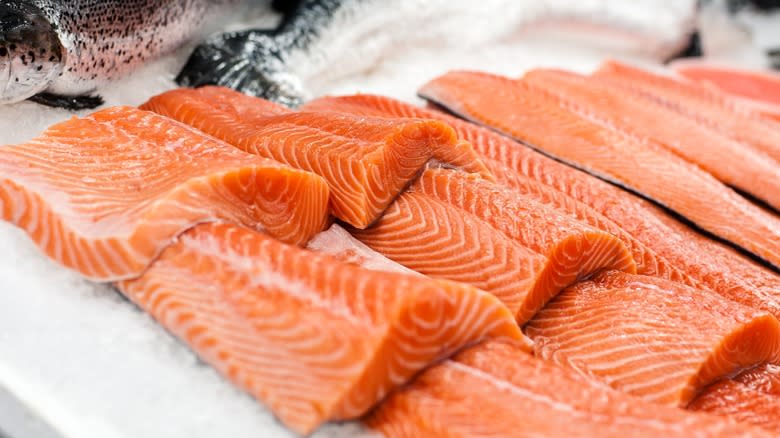
Fish farming is an extremely controversial topic in the food industry. With a push for the end of raising fish using practices that wreak havoc on the environment and the animals themselves, many consumers are opting for wild-caught seafood as opposed to the farm-raised options typically found in grocery stores. If you're a regular Aldi shopper, you might have been under the impression that the franchise's Alaskan salmon fits into the wild-caught or sustainably-raised category. This was likely due to the product's packaging, which formerly read "Simple. Sustainable. Seafood." on the label. Unfortunately, what the sticker advertised wasn't exactly true.
Two lawsuits were brought against the discount grocer in 2021 for deceptive, false marketing regarding its Alaskan salmon product. The plaintiffs both declared that while the label on the fish professed sustainability, the fish farming techniques implemented by Aldi's salmon suppliers are anything but. Aldi's Alaskan salmon are reportedly raised in Chile on a fish farm that employs unsustainable techniques, including environmentally hazardous net pens and chemicals. Both lawsuits were dropped when Aldi gave in, agreeing to change the labeling on its product so as not to give shoppers any false ideas about the origins of its fish. You'll have to decide whether or not this truth alters your desire to purchase Aldi's salmon in the future.
Myth: None Of The Meat At Aldi Is Halal
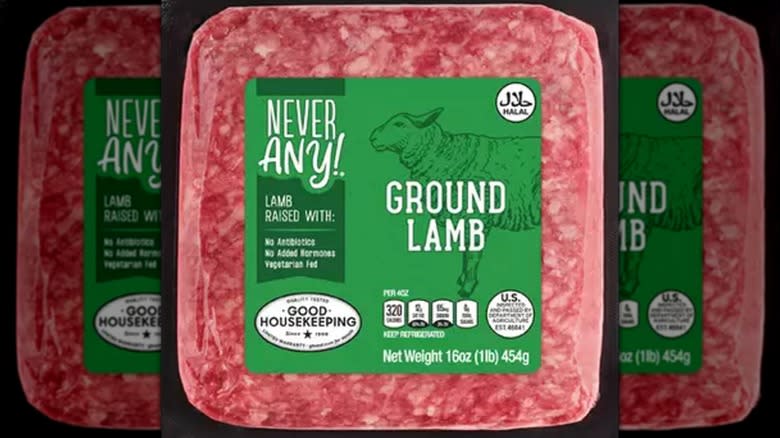
In Islam, meat is not considered acceptable to eat unless it has been processed in a way that meets halal standards, which includes both prayer during the slaughter as well as a swift, humane, and respectful death for the animal. Finding halal-certified meat in the United States can be notoriously difficult -- especially in your standard grocery store. Recently, however, smiles have been brought to the faces of Muslim shoppers strolling through the aisles of the popular grocer, Aldi. Halal-certified meat products have entered the building.
Aldi's Never Any! brand features two products with a visible stamp proudly declaring them halal: ground lamb and bone-in lamb chops. Many Muslim consumers are expressing their excitement online, with one TikTok user sharing "I still can't get over Halal meat being at Aldi" while showing the label on the ground lamb, and others raving about the lamb chops. It's important to note that the Never Any! brand appears to be one of the first of Aldi's meat providers to obtain Halal certification, so opting for these products is the only way to ensure acceptable meat from the company — at least, for now. Who knows? Perhaps more suppliers will hop on board in the future.
Myth: Its Meat Has Synthetic Colors
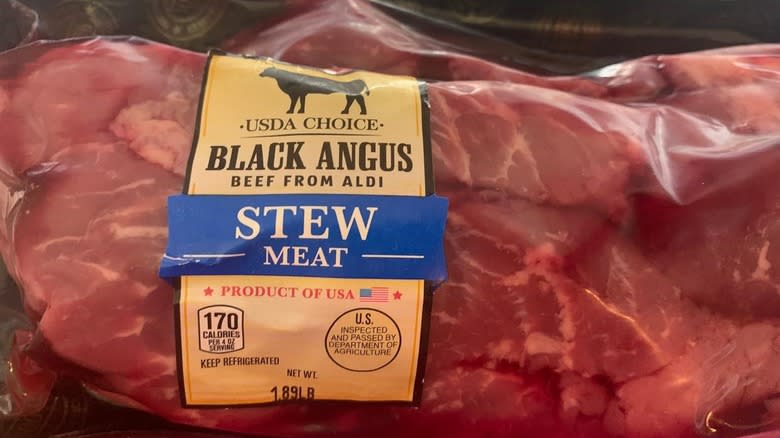
Often, shoppers look at the color of a slab of meat to determine its quality and freshness, and when it comes to Aldi's price cuts, some customers have reported feeling that the pinkness in its steaks and prime ribs is so bright, that it feels too good to be true. This has caused some shoppers to go so far as to question whether or not there could be artificial colors or dyes injected into the flesh itself. However, if you've ever felt on the fence regarding a slab of super-pink meat discovered in the cold aisle of the discount grocer, we have some good news to report: None of Aldi's products -- its fish, beef, and pork products included -- contains fake colors.
This information comes straight from the corporation itself. In 2015, its website outlines, all synthetic colors were dropped from Aldi-exclusive products in response to consumer demand. "The rule around here is if it isn't necessary, we don't do it. Period. End of story," reads a promise on the Aldi corporate website. In addition to leaving synthetic colors in the past, that same year the company also dropped any and all artificial flavor enhancers (otherwise known as MSGs) and partially hydrogenated oils (trans fats) from its food.
Myth: Its Kirkwood Chicken Nuggets Are Dairy Free
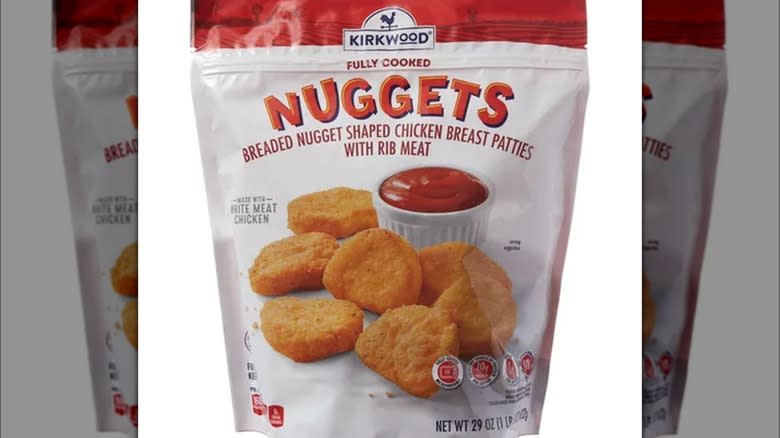
It's one of the most popular nugget brands offered in Aldi's frozen section, but the Kirkwood Chicken Breast Nuggets' celebrated recipe has undergone some changes. The nuggets, which were previously dairy-free, have had dairy subtly slid into the formula. While this may not be a deal breaker for all, it certainly could be for shoppers with dairy allergies -- and affected consumers are none too happy about the change.
"Kirkwood chicken nuggets now contain milk," reads the title of a recent post on the Aldi subcommunity on Reddit. The poster, who declared the thread a public service announcement, explained that upon arriving home from the store, they discovered the sneaky new ingredient listed on the back of the bag. This addition rendered the product inedible for the family in question, as one of the household members has a severe dairy allergy.
The poster and many commenters expressed dismay over the change, with one commenter going so far as to claim, "A lot of Aldi staples have 'new' recipes. And none for the better." Ouch. While alterations can be inevitable for the store-bought products we know and love, it's worth reaching out to Aldi if you're disappointed in a product change. The company promises to take its customers' requests seriously, so you never know whose ears your valued feedback might reach.
Read the original article on Mashed

